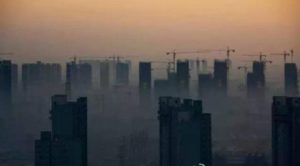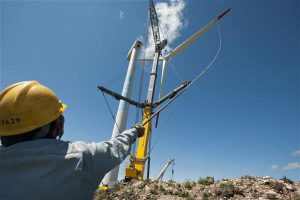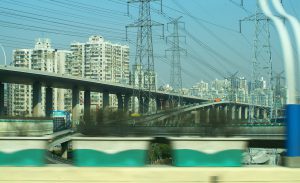China’s cement industry would be liable for a huge bill if it had to pay the external costs of pollution, a finding that lenders to the sector should bear in mind as central government enforces new environmental laws and aims for greener growth.
Cement producers are major users of heat and electricity generated from coal, and emit large amounts of toxic compounds, making the sector one of the main contributors to the thick smog that often shrouds Chinese cities.
That means scrutiny of the cement’s sector’s dire environmental record is increasing, said Chaoni Huang, head of business development in Asia with UK-based financial analysts Trucost, one of the co-authors of the
report.
“Polluter pays legislation increasingly means that cement companies will have to disclose how they are measuring and managing their environmental performance,” Huang said, adding that investors would need to price these risks accordingly.
Efficiency upgrades and shutting down surplus capacity would help lower the cement sector’s environmental footprint, but would likely saddle the sector with extra costs, said the report, which was also written by Innovation Centre for Clean Air Solutions, a Chinese think tank.
Paying the costs of the environmental damage caused by cement, or upgrading technology to make it less polluting, could mean that banks withdraw from financing the sector and some producers become economically unviable, the report added.
This raises the prospect of
big job losses in a sector that employs hundreds of thousands in China.
The external cost of air pollution caused by 32 publicly-listed cement companies surveyed by the report (around half of China’s total output of cement) was valued at 200 billion yuan (US$31 billion), a figure equivalent to 43% of the companies’ combined revenue that year.
External costs, also known as ‘externalities’ by economists, are the environmental and social damages caused by a company’s pollution and are rarely measured or priced by companies themselves. The joint report is the first attempt to calculate the cost of industry externalities in China’s cement sector.
More than 80% of cement producers’ air pollution-related external costs come from the health impacts of particulate and mercury emissions, the report said.These substances are extremely harmful to human health and are also blamed for poisoning China’s water and soil, as well as its air.
The cement industry accounted for 15-20% of China’s PM2.5 emissions, 3-4% of sulphur dioxide emissions and 8-10% of nitrogen oxides emissions, and according to a recent report, premature deaths from outdoor air pollution in China reached between 350,000 and 500,000 in 2010.
"If we ask companies to foot all of these external costs its questionable whether many companies in cement industry will be able to survive, and whether the bank will still be able to invest in the sector," said Hu Guibin, director of the credit and investment management division at the Industrial and Commercial Bank of China.
China is responsible for 60% of the world’s cement production in view of
the biggest construction boom in history, but until very recently, the sector was largely untouched by environmental regulation.
Environmental ‘stress tests’
Environmental taxes imposed on cement companies would force banks to reassess their credit risk and adjust their credit policies to encourage enterprises to choose more environmentally-friendly production, Hu said.
Environmental ‘stress tests’ could form the basis for guidelines for banks giving loans to enterprises in the future, he added.
“Investors who only care about economic returns are also now wondering whether environmental policies will become stricter,” said Zhao Lijian, Director of the China Environmental Management Program at Energy Foundation China.
Accountability
In September, China’s State Council released a so-called
“ecological civilisation” plan to make companies more accountable for the pollution they cause, including plans for compulsory disclosure of environmental protection information by publicly-listed companies.
One of the reasons that investors are unable to make more environmentally-friendly decisions is a major lack of information, said Zhao. Only 14% of the cement companies analysed by the Trucost report released any environmental information. Companies that have lower levels of disclosure tend to pollute more, the report added.







